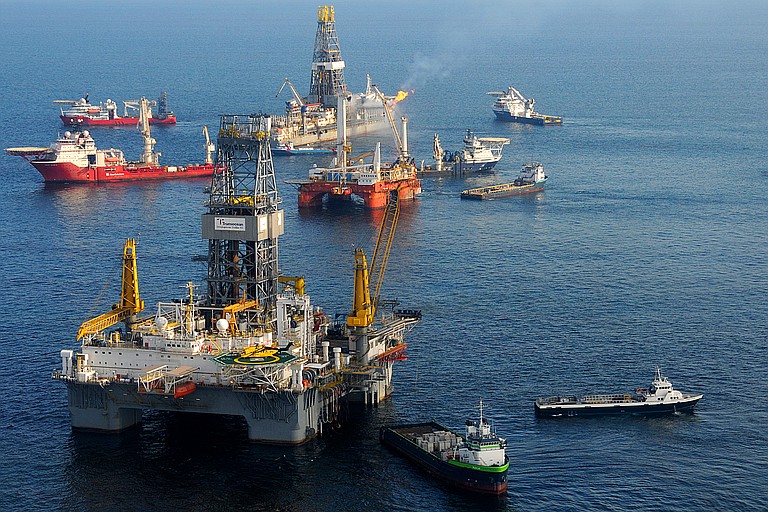Environmentalists worry that a flurry of activity around drilling rigs could rival that of other ecological hazards, such as the Deepwater Horizon. Courtesy Department of Defense
Wednesday, October 3, 2012
The battle over a proposal to open up natural gas exploration in Mississippi that has been raging for almost a year is shaping up to be another protracted showdown between environmentalists and boosters of fossil-fuel energy development in Mississippi.
On Sept. 21 the Mississippi Development Authority, which formulated rules for how the state would conduct offshore gas and oil leasing, rejected drilling foes' appeal to halt a lease sale from taking place.
New Orleans-based Gulf Restoration Network and the Mississippi Sierra Club, which have been fighting to block the state from leasing state-controlled waters off the Mississippi Gulf Coast, say they will appeal MDA's most recent decision to Hinds County Chancery Court.
"People don't come down here to be in an industrial zone," Robert Wiygul, an Ocean Springs-based attorney who represents the environmental groups, told the Jackson Free Press last week.
While natural gas is abundant, relatively cheap and clean compared to other sources of fossil fuels, state environmentalists have enumerated a number of economic and ecological concerns that serve as the basis for clawing tooth and nail to keep energy companies away from the Mississippi coast.
Wiygul said MDA did not follow state law that requires an economic-impact statement. Under the statute, agencies proposing new rules or significant amendments—defined as costing more than $100,000 to comply with—must consider the rule's economic impact.
Earlier this year, MIT-trained engineer Jeffrey K. Bounds conducted an analysis that concluded that even if one in 20 visitors—5 percent—stay away from the Gulf Coast, the loss of state tourism revenue over the life of the reserve would amount to $168.5 million, wiping away the state's anticipated revenues from sales of oil and gas leases.
Louie Miller, executive director of the Mississippi Sierra Club, argues that MDA didn't consider possible environmental threats in drafting its rules. He points to the potential for an hydrogen sulfide gas release and subsidence, or cratering, which can erode the coastline as reasons Gov. Phil Bryant should put the kibosh on coastal drilling.
Colorless, flammable and carrying a rotten-egg stench, hydrogen sulfide occurs naturally in hydrocarbons such as crude oil and natural gas. Hydrogen sulfide's danger lies in the fact that because the gas is heavier than air, it travels along the ground and may collect in low-lying enclosures such as basements and sewer lines.
Besides the danger of combustion, the gas is an irritant and chemical asphyxiant, highly dangerous to people and pets. In low doses, the gas can irritate respiratory functions. High concentrations can cause convulsions and an inability to breathe, either of which could result in coma or death.
During Hurricane Isaac, 5 million pounds of pollution seeped into the water and air, including 277 tons of sulfur dioxide and 1,200 pounds of hydrogen sulfide from just one refining station. In Sept. 2007, such a gas release caused a half-dozen people to see a local doctor after they reported feeling ill. Just because the release appeared to be an isolated incident doesn't mean cause for alarm does not exist, said the Gulf Restoration Network's Mississippi organizer, Raleigh Hoke.
"It doesn't happen every summer. It doesn't happen every year, but when it does, it's certainly detrimental to human health," Hoke said.
In the event of a H2S release, emergency management officials tell people to remain in their homes with the windows and door closed, which isn't an option for the hundreds of visitors to the barrier islands on a given day, Hoke added.
Gulf Island National Seashores, a division of the National Parks Service, echoed the concerns of Miller and Hoke in its official comments to MDA on the drilling rules implementation. Evidence of drilling's potential deterioration of the Mississippi coastline can be found in neighboring Louisiana, Miller said.
National Oceanic and Atmospheric Administration and Louisiana State University issued a 2003 report warning that portions of the Gulf Coast were dropping at an "alarming rate," with the possibility that coastal Louisiana and Mississippi could lose up to one foot of elevation in the ensuing decade.
Researchers at the University of New Orleans in 2009 determined that subsidence along the Louisiana Gulf Coast was the result of tectonic activity, sediment compaction, sediment loading, glacial isostatic adjustment, surface-water drainage and fluid withdrawal, which includes oil development. Of the five primary causes of subsidence, fluid withdrawal caused the most shrinkage, up to 23 millimeters per year.
Brent Christensen, MDA's executive director, wrote to Sierra Club attorney Wiygul that "fair and adequate consideration given to the comments of all interested persons, the economic-impact statements were adequate for the adoption of the rules and regulations, and the rules and regulations took into consideration the public trust."
MDA spokesman Dan Turner declined further comment on this story, citing the likelihood of litigation.
Comment and contact R.L. Nave at [email protected].

Comments
Use the comment form below to begin a discussion about this content.
Sign in to comment
Or login with:
OpenID